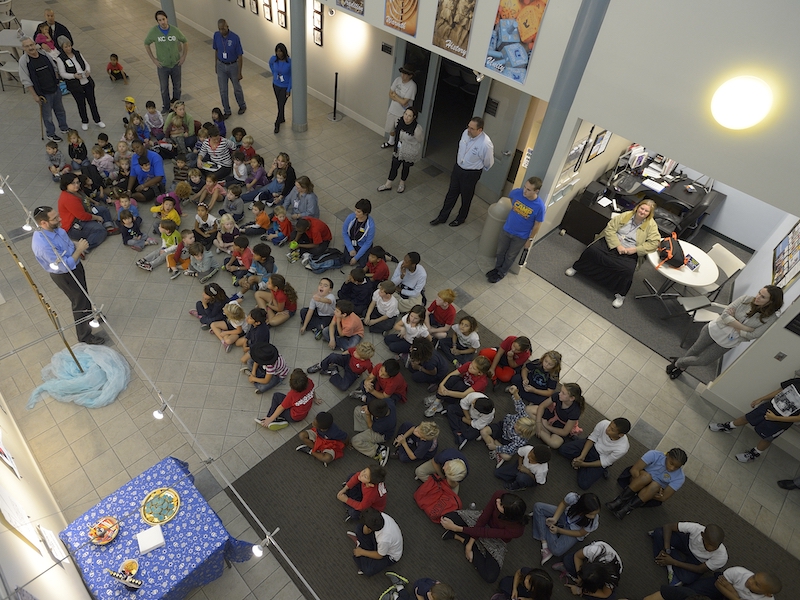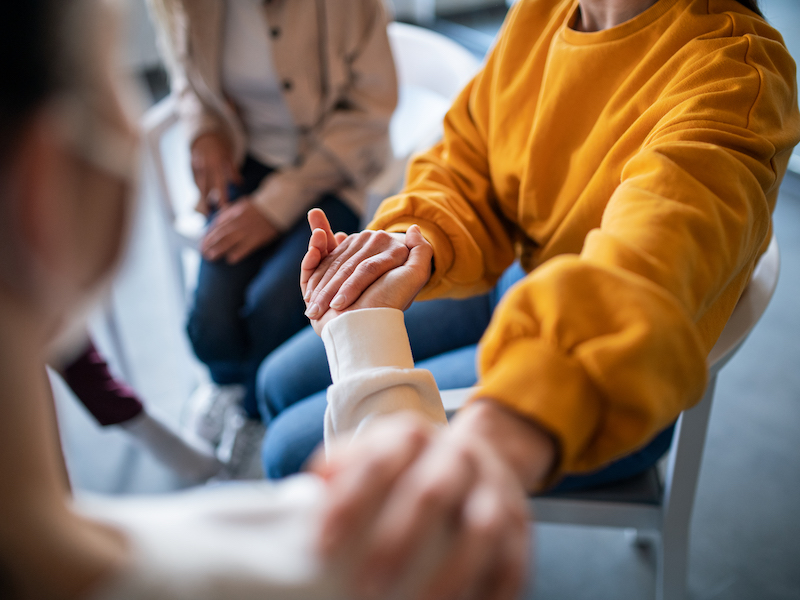Your Daily Phil: Grinspoon renews camp grants + How Repair the World will spend $7 million
Good Wednesday morning!
When the Harold Grinspoon Foundation announced, in March 2020, that it would be providing $10 million in unrestricted matching grants to nearly 100 Jewish overnight camps, it was one of the Jewish philanthropic world’s first major initiatives to tide over nonprofits during the surging COVID-19 pandemic.
Nearly all camps closed that summer, and the matching grants, called All Together Now, were a piece of the stopgap funding that allowed the camps to survive. The grants were renewed the next year — with the Grinspoon Foundation contributing $5 million, an anonymous donor giving another $5 million and some additional funding coming from other foundations — to help camps close budget gaps from 2020. The grants were matched with double the fundraising — about $20 million — from the camps, which were given allocations based on size.
But now, as camps increasingly return to the pre-pandemic status quo, and enrollment at many of them is projected to exceed 2019’s numbers, the Grinspoon Foundation is renewing All Together Now for at least a third year, eJewishPhilanthropy has learned. The foundation will give a total of up to $5 million to be matched at the same rate by 106 camps. It’s one more sign that some interventions of 2020, intended to address an emergency, are becoming permanent features of the Jewish nonprofit world.
“Our mission is long-term financial sustainability,” Sarah Eisinger, director of the foundation’s JCamp 180 program, told eJP. “It starts to get baked in and it starts to influence the rest of our grant making. I hope we take these lessons from what we learned in All Together Now and carry that forward to the rest of our grant making.”
The grants are a significant increase from the Grinspoon Foundation’s prior giving to Jewish camps, which totalled approximately $1 million annually pre-pandemic. In addition to more than $20 million given by the foundation and its partners in 2020 and 2021, more than 34,000 donors gave a total of nearly $38 million in matching grants, with the average donation hovering a bit above $1,000.
This year, the reasoning behind the program has shifted. At the pandemic’s onset, camp professionals and their funders worried that COVID-19 could mean the end of Jewish camping. Now, although it’s clear that most camps will survive the pandemic largely intact, Eisinger says another set of worries justifies ongoing funding — including inflation, increased mental health support and a growth in scholarships that results from rising tuition.
“There’s a whole range of reasons why costs at camp are more expensive,” she said. “COVID has a long tail… So while their enrollment might come back this summer, it doesn’t mean that their financial model is perfectly whole.”
Counting Jews
U.S. Jewish communities are commissioning a flood of new population studies — and figuring out how to use them


Rabbi David Cantor lights a candle on the first night of Hanukkah with children at the Alpert Jewish Community Center in Long Beach, Calif., in 2013. Long Beach is one of many Jewish communities whose population is being evaluated in a new study.
Since arriving in Long Beach, Calif., in 2019, Zachary Benjamin has overseen the mergers of the Jewish federation, community foundation and community center into one organization: Jewish Long Beach, where he serves as CEO. The community is now doing its first study since the 1950s. Between the mergers and COVID, “You just had a perfect storm of necessity to do this research,” Benjamin said. Long Beach is one of many Jewish communities that have commissioned population studies recently, reports Lev Gringauz for eJewishPhilanthropy.
Double the studies: The Cohen Center for Modern Jewish Studies at Brandeis University, which has conducted a string of communal surveys, has never been busier. Between writing proposals, planning surveys, processing data and issuing finished reports, the center’s team of eight researchers is working on studies in 10 communities – double its work from a few years ago – including some of the largest Jewish populations in the country, like Los Angeles’.
A changing landscape: The demand for new surveys comes amid a wave of organizational changes in the Jewish world. Some communities have seen institutions merge — including federations that have combined with other local organizations like JCCs. The COVID-19 pandemic also changed how many Jews engage in their communities, in addition to having an impact on their financial ability to be involved.
Using the data: Researchers are wrestling with whether their role extends beyond just collecting and presenting data to communities. But after seeing how many communities don’t use the studies they pay for, Janet Krasner Aronson, the center’s associate director, wants to push for more action. “I’ve been struggling with this issue about how to use the data for a while,” she said. “I would really love to focus on that and work with communities…[to] come up with a better plan up front.”
Sharing Service
Sharing Repair the World’s adaptive strategic plan


“The pandemic shed light on the interconnectivity between our health, safety and the ability for our communities to thrive. Meanwhile, young Jews are reinterpreting what it means to be Jewish in America, with more wanting to connect with organizations that align with their values,” writes Repair the World CEO Cindy Greenberg in an opinion piece for eJewishPhilanthropy.
Cash influx: “In summer 2021, Repair the World received $7 million from MacKenzie Scott and Dan Jewett to expand our efforts to mobilize Jews and their communities. This gift highlighted the increasingly powerful role that service will play in building bridging across lines of difference, meeting needs exacerbated by COVID, fostering empathy for one another and furthering social change in the years to come. These funds will allow us to build vibrant Jewish life to an unprecedented scale, engaging tens of thousands of young adults in service and Jewish learning annually. “
Rising to the challenge: “We know it is a clear challenge and invitation to do even more: more service, more partnerships, and more investment to elevate service grounded in Jewish values and in partnership with our communities through solidarity, achdoot. We glimpse a future where Jewish service is centered more intentionally in Jewish life. We are building a far-reaching movement that will empower young Jews and their communities beyond the pandemic, igniting a commitment to repairing the world, tikkun olam, through service in support of social change.”
Shifting Paradigms
Forging new pathways: The trans halakha project


“When you think of trans identity and halakha, what comes to mind? Recent questions at this intersection have included: ‘How can I call a non-binary person to the Torah?’ and ‘What is a ceremony called if it’s not a bar or bat mitzvah?’ (No, it’s not called a ‘they mitzvah!’) Others think of ritual moments: ‘What are the proper ways to honor and dignify trans bodies after death?’ and ‘How do trans bodies impact the assumed requirement for circumcision as part of a conversion process?’ Overwhelmingly, these responses are presented as points of tension, areas in which trans Jews do not fit within existing paradigms,” write SVARA’s R’ Becky Silverstein and Laynie Soloman in an opinion piece for eJewishPhilanthropy.
How it happened: “Upon launching this project, we heard from trans and non-binary Jews who were yearning for more pathways to authentically learn from and play with our tradition. We also heard from colleagues working as clergy and educators who were hungry for resources to support their trans congregants, students, and community members. We launched this project knowing that our work would only begin to touch the communal need for liberatory pathways into dignified halakha that serves, supports and uplifts trans voices.”
Pioneering pathways: “Determined to center the voices of trans and non-binary Jews, we began with a survey of our community’s experiences with and curiosities about halakha. Within weeks we received almost 200 responses. The results of this survey were clear: The unique lives, bodies and experiences of this growing subset of our community demand new halakhic pathways that are rooted in the sacred experiences of self-determination, agency, individual expertise, fluidity and holy liminality.”
Worthy Reads
On the Job: Jewish Insider’s Gabby Deutch profiles Ludovic Hood, a senior advisor in the office of the special envoy to monitor and combat antisemitism. “Hood’s career has taken him around the world, with stops in Paris, Bahrain and Qatar. But his first year-plus in this role was spent in Foggy Bottom, hunched over books, diving deep into the history of the world’s oldest hatred, ‘whether it’s the centuries-long misery that most Jewish communities in Eastern Europe suffered through, culminating in the Holocaust,’ Hood told JI in a recent interview, ‘or what Sephardic communities dealt with, notably in the 20th century, when over a million of them [were] kicked out of half a dozen or so Arab countries with no talk of return.’” [JI]
Lessons Learned: The COVID-19 pandemic — and the philanthropic response to it — taught many valuable lessons that can be applied going forward, Susan Watson suggests in the Chronicle of Philanthropy. “Much of the United States seems to have moved on from the pandemic. States and cities are shutting down vaccination and free testing sites, mask mandates have fallen nationwide, and people are streaming into restaurants, bars, and entertainment venues after two years of social isolation. While some of these developments may be premature, one thing is clear: The nation’s public-health system and the grant makers that support it must not move on from what they learned about how to build a better, more resilient public-health system. The enormousness and urgency of the challenge required grant makers to be bold, try new approaches, reimagine bureaucratic requirements, and embrace ambiguity. The question now is, will we heed those lessons or return to the status quo?” [ChronicleofPhilanthropy]
Word on the Street
Israel’s government faces a potential crisis after coalition whip Idit Silman, a member of Prime Minister Naftali Bennett’s Yamina Party, quit the coalition on Wednesday, accusing it of “harming” Israel’s Jewish identity. Her defection deprives the coalition of its one-seat majority…
North Carolinawill hold off on making a decision on divesting from Unilever over its subsidiary Ben & Jerry’s move to end sales in what it called “Occupied Palestinian Territory” until at least the end of the year…
Rep. Grace Meng (D-NY) visited the Forest Hills Jewish Center to meet with volunteers from the Queens Jewish Community Council who were putting together Passover packages at an event sponsored by the Met Council…
Forbesturns the spotlight on Josh Kushner, the first member of the Kushner family to make the magazine’s list of the world’s richest people…
The first Jewish wedding in Ukraine to occur since the onset of the Russian invasion of the country was held earlier this week in Dnipro…
A flight sponsored by the American Jewish Committee carrying 141 Ukrainian Jews landed in Israel yesterday…
Ted Comet, the honorary associate executive vice president of the American Jewish Joint Distribution Committee, will receive the Mandelkorn Award for Distinguished Service at the upcoming JPro22 conference of Jewish professionals. Comet has been involved in Jewish service work since the end of World War II…
Pic of the Day


Kalush Orchestra, Ukraine’s entry into the 2022 Eurovision Song Contest, performs for Ukrainian Jewish refugees during a show Tuesday at a hotel in Jerusalem.
Birthdays


Former justice of the Supreme Court of Israel, the aunt of Benjamin Netanyahu, Shoshana Netanyahu…
Educator often considered the founder of the modern small schools movement, Deborah Meier… Born in Amsterdam, she survived the Holocaust, moved to Israel in 1978, visual artist, textile designer and art teacher, Helen Berman… Chemist, writer and professor of chemical and biomolecular engineering at NYU’s Tandon School of Engineering, Mark Mordecai Green… Head of MTV Documentary Films, she has won 32 individual Primetime Emmy Awards, Sheila Nevins… Academy Award-winning best director for “Rain Man,” produced and directed many films including “Diner,” “Good Morning Vietnam,” “Bugsy” and “Wag the Dog,” Barry Levinson… Santa Monica, Calif.-based poet, critic and teacher, Nancy Shiffrin… Founder and chairman of Cognex Corporation, Robert J. Shillman… Founder and CEO of Emmis Communications, former owner of the Seattle Mariners, Jeff Smulyan… Political activist, artist and author, Mary Fisher… Former director of the digital deception project at MapLight, Ann Ravel… Los Angeles-based playwright, performer and teacher of autobiographical storytelling, Stacie Chaiken… Director, producer, and writer, winner of two Academy Awards for best documentary feature, Rob Epstein… Scholar of piyyut (ancient and medieval Hebrew poetry), head of the Fleischer Institute for the Study of Hebrew Poetry, Shulamit Elizur… Philanthropist Jeanie Schottenstein… Professor of constitutional law at the University of North Carolina School of Law, Michael J. Gerhardt… Senior political analyst for CNN and a senior editor at The Atlantic, Ronald J. Brownstein… Director, screenwriter and producer of television comedies, Steven Levitan… Deborah Granow… CEO of the Motion Picture Association, former U.S. ambassador to France, Charles Hammerman Rivkin… Reporter for The New York Times, Glenn Thrush… Screenwriter and producer, Doug Ellin… Serial entrepreneur Richard Rosenblatt… Former Israeli consul general in New York, now CEO of Israeli private equity fund Amelia Investments, Asaf Shariv… Founder and chief investment officer of Hong Kong-based Oasis Management Company, he serves as vice chairman of the Ohel Leah Synagogue in Hong Kong, Seth Hillel Fischer… Director of multigenerational philanthropy for AIPAC, Jay Haberman… Actor and filmmaker, Zachary Israel “Zach” Braff… Teacher of classical mandolin at Mannes College in NYC, Joseph Brent… Resident scholar at the American Enterprise Institute, he is the founding editor of National Affairs, Yuval Levin… Co-founder and executive editor of Modern Loss and features editor for Chalkbeat, Gabrielle Birkner… Member of the Knesset for Likud, Shlomo Karai… Owner-chef of Ramen Hood in Los Angeles, he was the winner of the second season of Bravo television’s “Top Chef,” Ilan Hall… Minneapolis-based associate director in the department of regional offices at AJC Global, Jacob Millner… Head coach of the New York Institute of Technology Division II NCAA men’s basketball team, Evan Conti…
Email Editor@eJewishPhilanthropy.com to have your birthday included.








